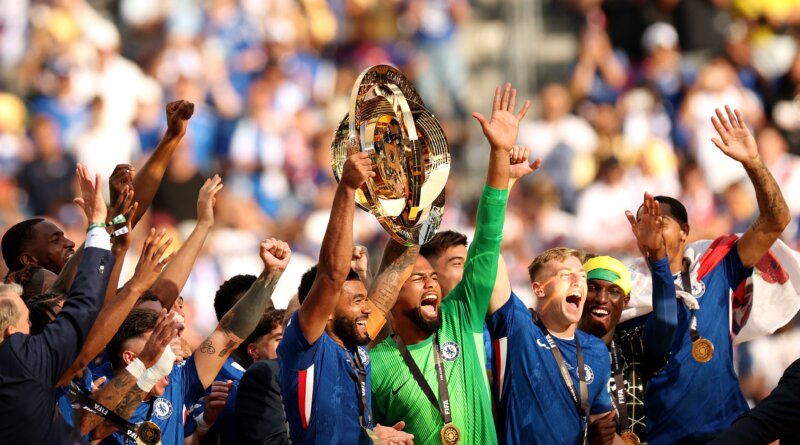Shaka Hislop Critiques 2025 FIFA Club World Cup “Success” Claims
FIFA Club World Cup observers are divided after the 2025 edition concluded with Chelsea defeating Paris Saint-Germain 3-0 at MetLife Stadium. While MLS Commissioner Don Garber lauded the month-long tournament as an “incredible success,” respected analyst Shaka Hislop remains unconvinced by the sweeping praise.
FIFA Club World Cup: A Defining Moment for North America?
FIFA Club World Cup 2025 marked a major shift for world football, expanding to a 32-team format and spotlighting North America as a burgeoning hub for the sport. Don Garber, the MLS Commissioner, captured the mood of local organizers by declaring: “This was a defining moment for the sport. I’m proud of how our country showed up at every level for the Club World Cup. A lot of the future growth in global soccer is happening right here in the United States and across North America. The Club World Cup showcased that.”
The tournament brought together elite teams from every continent, with Chelsea lifting the trophy after an emphatic victory over PSG. The spectacle highlighted both emerging North American infrastructure and the growing appetite for top-tier football across the region.
Shaka Hislop: “Not Falling Out of My Chair” Over Tournament Success
Shaka Hislop, the former Premier League goalkeeper and prominent football pundit, took a more measured stance when discussing the 2025 FIFA Club World Cup. Speaking on the Futbol Americas podcast, Hislop acknowledged the event surpassed his initial expectations, but he expressed skepticism about Garber’s glowing review.
“It’s been more successful than I was expecting, I’ll hold my hands up and admit to that,” Hislop said. “Whether I’ll go as far as to say it’s been an ‘incredible success?’ I’m not entirely sold on that… Let’s say PSG have an injury crisis in six months’ time, how will they reflect on this summer? There are a lot of unknowns that we’re still trying to work through for the European clubs.”
Hislop highlighted the logistical challenges the new format introduces for top European teams. With Chelsea and PSG only just completing their campaign, both clubs now face a condensed offseason before their domestic leagues resume. “Do you rest? Do you keep things ticking over? There are a lot of unknowns about this tournament that, particularly for the European clubs, I’m not sure how they’ll navigate. The real measure of success might only become clear in six or nine months.”
While he concedes the tournament was “more successful than I expected,” Hislop maintains a cautious outlook: “I’m not falling out of my chair like Don Garber.”
Herculez Gomez: The “Americanization” of the Club World Cup
Former USMNT forward Herculez Gomez also weighed in, offering a nuanced perspective on the controversial staging of the FIFA Club World Cup in North America. Gomez credited the tournament’s ambition but pointed to persistent gripes about its local organization.
“What people hate about this tournament are the North American things,” Gomez asserted. “The grass over field turf, the rain delays with thunderstorms, the heat, the time—all these things, those are the things they don’t like about this. The CWC is a fantastic idea: football for all. There should be a place where Auckland City gets to play against Boca, where Auckland City has a chance to tie Boca, and yes, Auckland City might get beaten 10-0 by Bayern Munich. That’s part of it.”
Gomez’s comments reflect a broader sentiment among global fans, who applaud the competition’s inclusive format but remain wary of “American” quirks—venue conditions, climate, and scheduling—that can disrupt the matchday experience. “It’s a ‘Get Lost’ to Don Garber because as Americans, the world doesn’t revolve around us. Football doesn’t revolve around us. What people don’t like about this tournament are very American things. The tournament as a whole is unbelievable.”
The FIFA Club World Cup’s Future and North America’s Role
The expanded FIFA Club World Cup is part of FIFA President Gianni Infantino’s vision for globalizing club football and boosting the sport’s popularity in new markets. With the United States, Mexico, and Canada set to host the 2026 FIFA World Cup, North America is at the epicenter of football’s next big growth phase.
However, the aftermath of the Club World Cup raises important questions. European clubs like Chelsea and PSG must now navigate fatigue, player rest, and preseason plans disrupted by a high-stakes summer. The success of the 2025 edition may hinge not just on immediate fanfare, but also on the tournament’s impact on player health and domestic league competitiveness over the coming months.
Opinion: A Promising Start—But Real Success Will Take Time
The 2025 FIFA Club World Cup undeniably raised the profile of football in North America and delivered memorable moments for fans across the globe. However, as Shaka Hislop rightly points out, the real measure of “success” will only become clear over time. European giants must adapt to the expanded calendar, while organizers should heed concerns about logistics and local conditions. For North America, this is a bold step forward—but the journey toward true global football leadership is only just beginning.
Your global gateway to nonstop football coverage:
Goal Sports News
Share this content:
